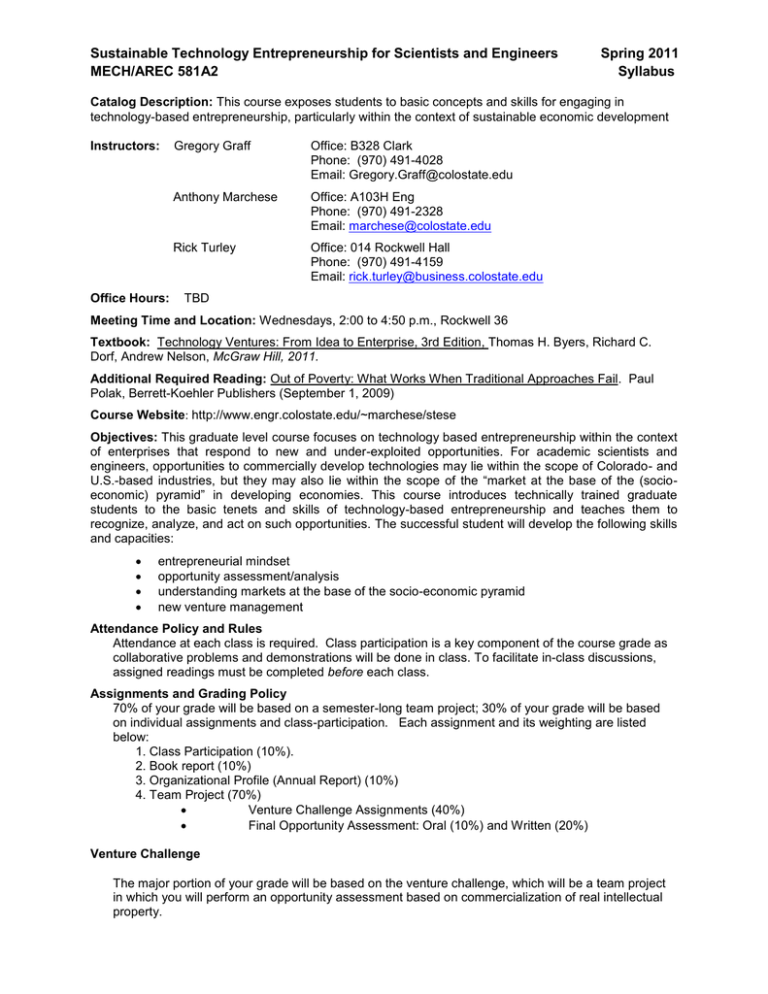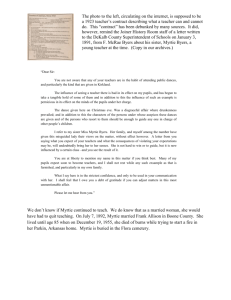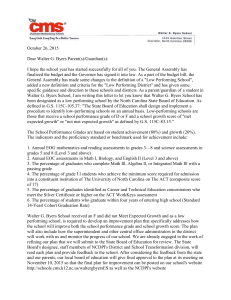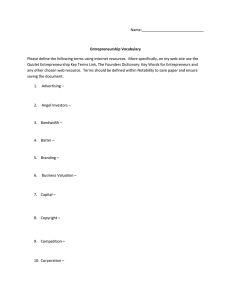Sustainable Technology Entrepreneurship for Scientists and Engineers ... MECH/AREC 581A2
advertisement

Sustainable Technology Entrepreneurship for Scientists and Engineers MECH/AREC 581A2 Spring 2011 Syllabus Catalog Description: This course exposes students to basic concepts and skills for engaging in technology-based entrepreneurship, particularly within the context of sustainable economic development Instructors: Office Hours: Gregory Graff Office: B328 Clark Phone: (970) 491-4028 Email: Gregory.Graff@colostate.edu Anthony Marchese Office: A103H Eng Phone: (970) 491-2328 Email: marchese@colostate.edu Rick Turley Office: 014 Rockwell Hall Phone: (970) 491-4159 Email: rick.turley@business.colostate.edu TBD Meeting Time and Location: Wednesdays, 2:00 to 4:50 p.m., Rockwell 36 Textbook: Technology Ventures: From Idea to Enterprise, 3rd Edition, Thomas H. Byers, Richard C. Dorf, Andrew Nelson, McGraw Hill, 2011. Additional Required Reading: Out of Poverty: What Works When Traditional Approaches Fail. Paul Polak, Berrett-Koehler Publishers (September 1, 2009) Course Website: http://www.engr.colostate.edu/~marchese/stese Objectives: This graduate level course focuses on technology based entrepreneurship within the context of enterprises that respond to new and under-exploited opportunities. For academic scientists and engineers, opportunities to commercially develop technologies may lie within the scope of Colorado- and U.S.-based industries, but they may also lie within the scope of the “market at the base of the (socioeconomic) pyramid” in developing economies. This course introduces technically trained graduate students to the basic tenets and skills of technology-based entrepreneurship and teaches them to recognize, analyze, and act on such opportunities. The successful student will develop the following skills and capacities: entrepreneurial mindset opportunity assessment/analysis understanding markets at the base of the socio-economic pyramid new venture management Attendance Policy and Rules Attendance at each class is required. Class participation is a key component of the course grade as collaborative problems and demonstrations will be done in class. To facilitate in-class discussions, assigned readings must be completed before each class. Assignments and Grading Policy 70% of your grade will be based on a semester-long team project; 30% of your grade will be based on individual assignments and class-participation. Each assignment and its weighting are listed below: 1. Class Participation (10%). 2. Book report (10%) 3. Organizational Profile (Annual Report) (10%) 4. Team Project (70%) Venture Challenge Assignments (40%) Final Opportunity Assessment: Oral (10%) and Written (20%) Venture Challenge The major portion of your grade will be based on the venture challenge, which will be a team project in which you will perform an opportunity assessment based on commercialization of real intellectual property. Week Date Topic(s) In Class Exercises / Due Dates / Project Work In Class Exercise: Introductions, Technology Based Opportunities 1 Jan. 19 Innovation, Entrepreneurship, and Development (All) 2 Jan. 26 3 Feb. 2 Economic Growth and the Technology Entrepreneur (Graff) Opportunity Evaluation and Product Planning (Marchese) 4 Feb. 9 Competitive Strategy (Turley) 5 Feb. 16 Innovation Strategies (Turley) Byers Ch. 5, 11.8, 11.9 6 Feb. 23 Ulrich and Eppinger, Ch. 4 Polak, Chap 4-5 7 Mar, 2 Indentifying Customer Needs (Marchese) The Business Plan (Turley) 8 Mar. 9 Ulrich and Eppinger, Ch. 5 9 10 Mar. 16 Mar. 23 Product Specifications (Marchese) Spring Break Types of Ventures (Graff) 11 Mar. 30 Legal Formation and Intellectual Property (Graff) Byers, Ch. 10 Mutschler & Graff, “IP Issues in the University Setting” 12 Apr. 6 Sources of Capital (Graff) Byers, Ch. 18 13 Apr. 13 Byers, Ch. 11 14 Apr. 20 15 Apr. 27 16 May 4 17 May 11 The Marketing and Sales Plan (Marchese) Base of the Pyramid Opportunities and the Envirofit Case Study (Hudnut) The New Enterprise Organization (Turley) Profit and Harvest; Financial Plan (Graff) Final Presentations Assignment Due: Ch. 1 Venture Challenge (Quad Chart Format) In Class Exercise: Project Selection Assignment Due: Ch 2.Venture Challenge Question 1 and Ch. 3 Venture Challenge Questions 1 and 2. Readings Confirmed Guest Speakers Lou Bucelli, Bucelli and Co, LLC. Byers, Ch. 1 Polak, Chapters 1-3 Amy Prieto, Co-Founder, Prieto Battery Stephen Schmutzer, Founder, Firefly Medical Byers, Ch. 4 Bryan Willson Co-Founder, Envirofit International and Solix Biofuels W.S. Sampath, Co-Founder, Abound Solar Ken Reardon CTO, OptiEnz Sensors Justin Discoe, co-founder, Sprig Toys Byers, Ch. 7 Byers Ch. 8 Envirofit Case Study Byers, Ch. 12 Byers, Ch. 16 and17 Scott Deeter, CEO, Ventria Bioscience Tim Reeser, COO, Cynergy, Todd Headley, CSURF Catherine Merigold, Vista Ventures Nathan Lorenz, VP Engineering, Envirofit International


